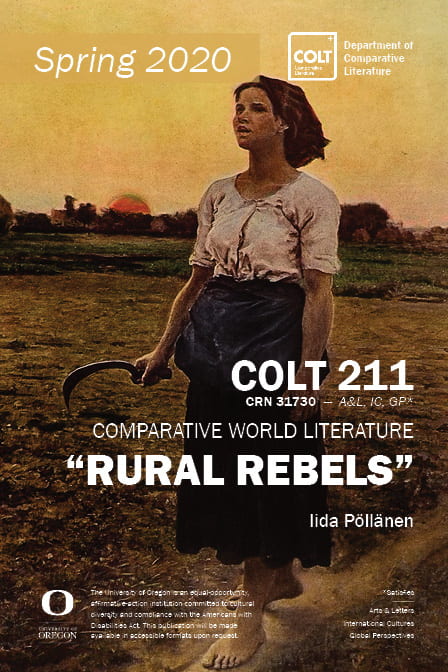COLT 211 - Comparative World Literature
CRN: 31731
Instructor: Iida Pöllänen
Term: Spring 2020
Rural Rebels
 The relationship between rural and urban areas in modern societies is often fraught with tensions; it is not uncommon to see cities and the countryside described as antagonistic with one another in cultural texts ranging from the realm of literature and film to political campaign rhetoric. This opposition, where rural areas are often associated with conservatism, backwardness, stability, and even fascism, has its roots in the history of urbanization and in the works of authors and thinkers who equated the city with modern progress and development. This course maps the historical development of such urban-rural relationships by focusing on texts that question and disrupt any neat binaries and instead show the political potential of the countryside, particularly for marginal and marginalized groups. We will look at fiction ranging from the United States to the Nordic countries to ask how conceptions of the countryside have formed and changed during the course of a century from the point of view of women, immigrants, and people of color. Of special interest are all types of rural rebel figures, who employ the countryside as a political platform, as a site for community-building and solidarity, as a location for technological development, or as a possibility to transgress mutually shared boundaries and norms – be they cultural, political, or sexual.
The relationship between rural and urban areas in modern societies is often fraught with tensions; it is not uncommon to see cities and the countryside described as antagonistic with one another in cultural texts ranging from the realm of literature and film to political campaign rhetoric. This opposition, where rural areas are often associated with conservatism, backwardness, stability, and even fascism, has its roots in the history of urbanization and in the works of authors and thinkers who equated the city with modern progress and development. This course maps the historical development of such urban-rural relationships by focusing on texts that question and disrupt any neat binaries and instead show the political potential of the countryside, particularly for marginal and marginalized groups. We will look at fiction ranging from the United States to the Nordic countries to ask how conceptions of the countryside have formed and changed during the course of a century from the point of view of women, immigrants, and people of color. Of special interest are all types of rural rebel figures, who employ the countryside as a political platform, as a site for community-building and solidarity, as a location for technological development, or as a possibility to transgress mutually shared boundaries and norms – be they cultural, political, or sexual.
Satisfies General Education Requirements:
- Group-Satisfying: Arts and Letters
- Multicultural Courses: International Cultures (IC)
- Core Education Multicultural: Global Perspectives (GP)